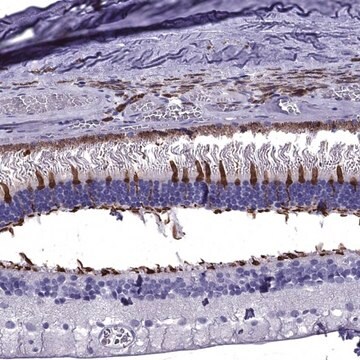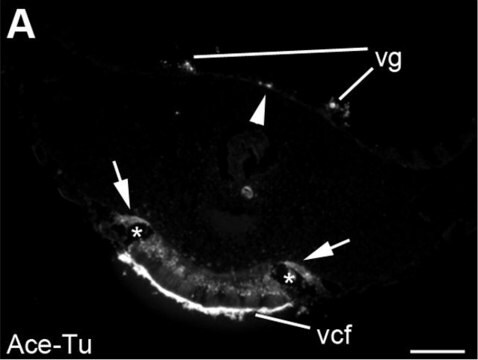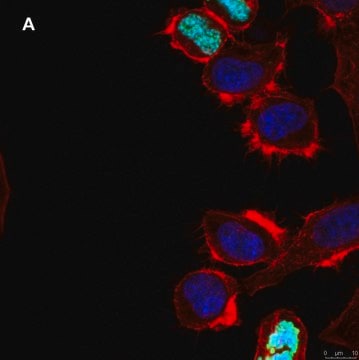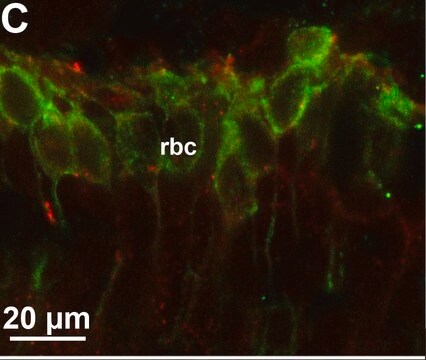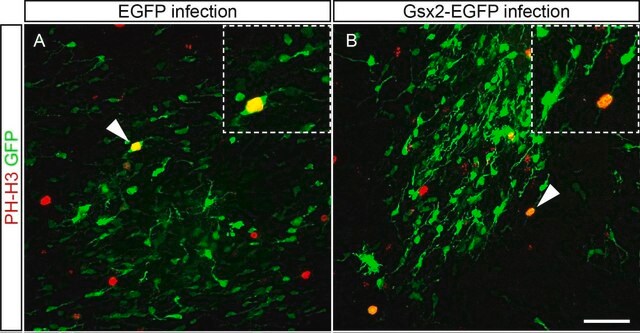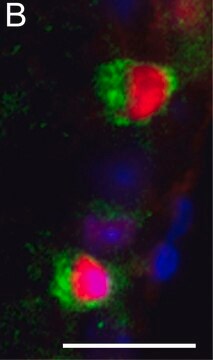추천 제품
생물학적 소스
rabbit
Quality Level
항체 형태
affinity isolated antibody
항체 생산 유형
primary antibodies
클론
polyclonal
분자량
antibody estimated mol wt ~46 kDa
정제법
affinity chromatography
종 반응성
rat, mouse
제조업체/상표
Chemicon®
기술
immunohistochemistry: suitable (paraffin)
western blot: suitable
동형
IgG
NCBI 수납 번호
UniProt 수납 번호
배송 상태
wet ice
타겟 번역 후 변형
unmodified
유전자 정보
mouse ... Arr3(170735)
rat ... Arr3(171107)
일반 설명
Arrestin-C (UniProt: Q9EQP6; also known as Cone arrestin, cArr, Retinal cone arrestin-3) is encoded by the Arr3 gene (Gene ID: 170735) in murine species. Arrestins are a superfamily of multi-functional proteins that regulate signaling and trafficking of the majority of G-protein-coupled receptors (GPCRs), as well as sub-cellular localization and activity of many other signaling proteins. Arrestin-C, a disulfide-linked, homodimeric protein, is predominantly found in inner and outer segments, and the inner plexiform regions of the retina. It is expressed in cone photoreceptors and pinealocytes and may contribute to the shut-off mechanisms associated with high acuity color vision. Arrestin-C is an elongated two-domain molecule with overall fold and key inter-domain interactions that hold the free protein in the basal conformation similar to the other subtypes. Several structural elements are reported to contribute to arrestin binding. The C-terminal acidic region serves as a regulatory role in controlling arrestin binding selectivity toward the phosphorylated and activated form of a receptor. The basic N-terminal domain directly participates in receptor interaction and serves a regulatory role via intramolecular interaction with the C-terminal acidic region. Also, two centrally localized domains are directly involved in determining receptor binding specificity and selectivity. Mutations in ARR3 gene in humans have been linked to X-lined myopia 26 that is characterized by typical tigroid fundus changes commonly seen in early onset high myopia. (Ref.: Gurevich, VV., et al. (2018). Protein Cell. 9; 986-1003; Xiao, X., et al. (2016). Mol. Vis. 22; 1257-1266).
특이성
This rabbit polyclonal antibody detects Arrestin-C. It targets an epitope within 12 amino acids from the C-terminal region.
면역원
Epitope: C-terminus
KLH-conjugated linear peptide corresponding to 12 amino acids from the C-terminal region of mouse Cone Arrestin.
애플리케이션
Anti-Cone Arrestin , Cat. No. AB15282, is a rabbit polyclonal antibody that detects Arrestin-C and is tested for use in Western Blotting and Immunohistochemistry (Paraffin).
Research Category
Neuroscience
Neuroscience
Research Sub Category
Sensory & PNS
Sensory & PNS
Tested Applications Immunohistochemistry (Paraffin) Analysis: A 1:250 dilution from a representative lot detected Cone Arrestin in mouse cerebellum, rat retina, and mouse retina tissue sections. Note: Actual optimal working dilutions must be determined by end user as specimens, and experimental conditions may vary with the end user
품질
Evaluated by Western Blotting in Mouse Retina tissue lysate. Western Blotting Analysis: A 1:500 dilution of this antibody detected Arrestin-C in Mouse Retina tissue lysate.
표적 설명
Target molecular weight ~50 kDa observed. 41.92 kDa calculated. Uncharacterized bands may be observed in some lysate(s).
물리적 형태
ImmunoAffinity Purified
Purified rabbit polyclonal antibody in buffer containing 0.02 M phosphate buffer, pH 7.6, 0.25 M NaCl, and 0.1% sodium azide.
저장 및 안정성
Recommended storage: +2°C to +8°C.
기타 정보
Concentration: Please refer to lot specific datasheet.
법적 정보
CHEMICON is a registered trademark of Merck KGaA, Darmstadt, Germany
면책조항
Unless otherwise stated in our catalog or other company documentation accompanying the product(s), our products are intended for research use only and are not to be used for any other purpose, which includes but is not limited to, unauthorized commercial uses, in vitro diagnostic uses, ex vivo or in vivo therapeutic uses or any type of consumption or application to humans or animals.
적합한 제품을 찾을 수 없으신가요?
당사의 제품 선택기 도구.을(를) 시도해 보세요.
Storage Class Code
10 - Combustible liquids
WGK
WGK 2
Flash Point (°F)
Not applicable
Flash Point (°C)
Not applicable
시험 성적서(COA)
제품의 로트/배치 번호를 입력하여 시험 성적서(COA)을 검색하십시오. 로트 및 배치 번호는 제품 라벨에 있는 ‘로트’ 또는 ‘배치’라는 용어 뒤에서 찾을 수 있습니다.
Phospholipid flippase ATP8A2 is required for normal visual and auditory function and photoreceptor and spiral ganglion cell survival.
Coleman, JA; Zhu, X; Djajadi, HR; Molday, LL; Smith, RS; Libby, RT; John, SW; Molday, RS
Journal of Cell Science null
Assessment of tropism and effectiveness of new primate-derived hybrid recombinant AAV serotypes in the mouse and primate retina.
Charbel Issa, P; De Silva, SR; Lipinski, DM; Singh, MS; Mouravlev, A; You, Q; Barnard et al.
Testing null
Sensitivity and kinetics of signal transmission at the first visual synapse differentially impact visually-guided behavior.
Sarria, I; Pahlberg, J; Cao, Y; Kolesnikov, AV; Kefalov, VJ; Sampath, AP; Martemyanov, KA
eLife null
Development and plasticity of outer retinal circuitry following genetic removal of horizontal cells.
Keeley, PW; Luna, G; Fariss, RN; Skyles, KA; Madsen, NR; Raven, MA; Poche, RA; Swindell et al.
The Journal of Neuroscience null
Katharina Kranz et al.
PloS one, 8(2), e57163-e57163 (2013-03-08)
Retinitis pigmentosa (RP) relates to a group of hereditary neurodegenerative diseases of the retina. On the cellular level, RP results in the primary death of rod photoreceptors, caused by rod-specific mutations, followed by a secondary degeneration of genetically normal cones.
자사의 과학자팀은 생명 과학, 재료 과학, 화학 합성, 크로마토그래피, 분석 및 기타 많은 영역을 포함한 모든 과학 분야에 경험이 있습니다..
고객지원팀으로 연락바랍니다.